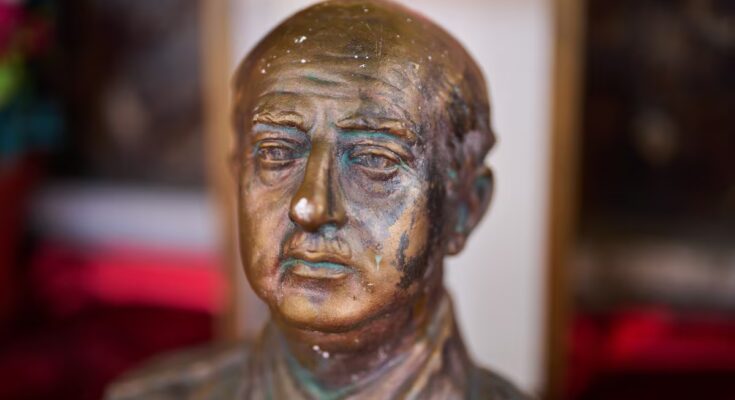Love for the country, this abstraction, also generates a visceral hatred towards it. And in the case of Francisco Franco, the latter mattered more than the former. A cold hatred subject to his most primal instincts. Absent from any trace of piety and which should not be forgotten on this 50th anniversary of his death. Especially because this ambivalent feeling seems to be reimposed on a minority, but not insignificant part of the population, through revived far-right options.
Whenever he had the opportunity, the dictator declared his supposed love for a rather imposed idea. But the facts prove the opposite: Franco hated us. And it is now more than ever to highlight it to begin to dismantle themes that permeate some layers of voters. Just when we believed that Western democracies were well rooted in Europe, fascism was reborn with new impetus. Conquer the sectors in the countries where they have suffered the most. Even by choice – that is, by opting en masse for those options, as in Italy and Germany – in a sinister boomerang that blackens and clouds our future again.
In the case of Spain, fascism’s coming to power did not happen through the ballot box. Unlike Mussolini’s party or the Nazis, when the Popular Front won the 1936 elections, the Spanish Falange won zero deputies. The citizens were disgusted by the dialectic of fists and guns that José Antonio Primo de Rivera, a completely failed politician, wanted to impose. Although a good part of the more radical conservative options were also concentrated in the Spanish Confederation of Autonomous Rights (CEDA) led by José María Gil Robles, the purely fascist party, the Hispanic equivalent closest to the ideology of Hitler and Mussolini, did not obtain any seats. This largely accelerated the July 18 coup and the strategy of asserting itself through a long war to destroy the enemy, as Paul Preston has demonstrated in numerous of his studies.
It was the option considered, decided and admitted by Franco without veiling himself even in front of the international press. “Whatever the cost,” he told American journalist Jay Allen when asked what the price would be for his advance as soon as he struck the blow. The correspondent of Chicago Tribune he asked and asked again. That is, it gave him the opportunity to clarify a stark and direct question: “Even if this means killing half the Spaniards?” The soldier replied again… “I repeat: whatever the cost”.
That half – or rather, the majority – of the Spaniards that the tyrant was willing to annihilate at any cost, involved the entire spectrum towards the radicalism of the anarchists and communists without also discarding parts of the right: liberals, leftists and nationalists, with a special place always reserved for the Freemasons. For them it fueled hatred and then spread fear. Two phases on which every regime of terror is based. Both were aimed at those peoples who democratically defended, for the most part, peaceful coexistence, the legitimacy of a republic supported on the basis of popular sovereignty. Something very specific in itself. The Spain of its time which, in its own right, accepted democracy mostly without murderous impulses…
What he denied, masked by a simple doctrinal approach where he hid an immense ambition for power. A power that he retained for the rest of his life thanks to two characteristics that he combined like no other: cruelty and sagacity. By uniting them, he destroyed everything that opposed his desires, even if that obstacle involved the majority of true Spaniards whom he and his people denied the right to exist. A true Spain that had no scruples when it came to extermination. The one he killed, in short, because he believed his own.
He had begun to experience it during the repression of Asturias in 1934, as Luciano Rincón under the pseudonym Luis Ramírez points out in a masterful book: Franco, the story of a messianismpublished by Ruedo Ibérico in 1964. “He is a Spanish general who specializes in fighting the Spaniards for a strange purpose in his career,” he writes. People disgust him. “Instinctively. Because he doesn’t have that precise sense of military mechanics and because, in turn, people are rejected by the army.”
That’s why he deeply distrusts them and attacks them. It’s revenge, pure spite as a member of an establishment whose frustrations Ortega y Gasset analyzes Spain of invertebrates. The thinker says that, entering the 20th century, an army with no war on the horizon caused the other classes to ignore it. “He was isolated, denationalized, without ties to the rest of society and dispersed within it.” This has led to a toxic psychological state which, according to the philosopher, “has germinated a fatal suspicion towards politicians, intellectuals and workers and has fermented resentment and antipathy towards the other social classes of the armed group”.
Thus the drift towards the coup was incubated. Much of that dynamic of resentment, all of that direct legacy of a false, distorted, delusional love for country is now reproduced in policy options with broad representation. These are, if possible, more serious drifts. They repeat slogans, speeches, embody dogmas and lies based on greatness to cover up the destruction, disintegration of the system. The fact that they connect today despite the lessons learned from history should make us reflect on the mistakes we have made in evaluating what we have accomplished and taking action. Fast. This led to the catastrophe of our civil war and continental apocalypse. Furthermore, in Spain as in the rest of the West, these new fascisms throughout the world proclaim their love for the country and their greatness. Trumpian From Make America great again (let’s make America great again).
What country? One where there is no space for that majority that defends coexistence in freedom, respect and integration of all citizens in a common peaceful project based on rights and freedoms where those who choose to build their future here are also welcome. Since this option is still the majority in our country, the affirmation of this love for Spain in the mouths of those who oppose democracy and the progress of open societies with the firm intention of closing them simply degenerates, as happened with Franco, into hatred.



